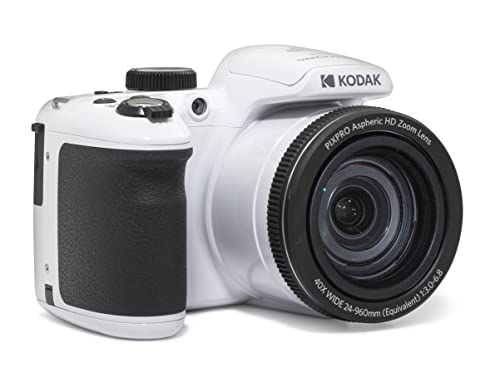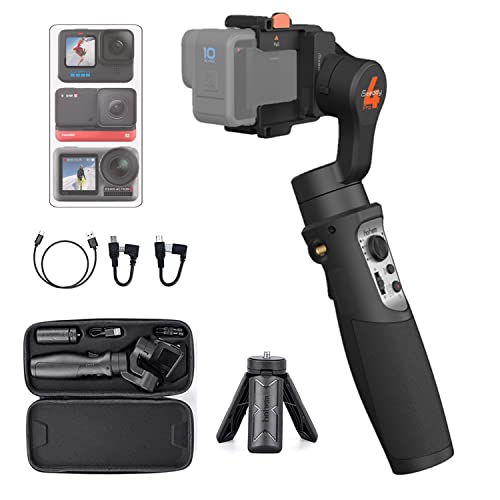


GoPro cameras have gained immense popularity for their compact size, rugged build, and ability to capture stunning action shots. But the question remains – are they considered professional cameras?
While GoPro cameras are certainly capable of producing high-quality footage, they are often seen as more of a tool for adventure enthusiasts, vloggers, and content creators rather than professional filmmakers. Their small sensor size and limited manual controls can be limiting in certain professional settings.
However, with advancements in technology and the release of models like the GoPro Hero 9 Black, which offers improved image quality and features like 5K video recording, some professionals are starting to incorporate GoPro cameras into their workflows for specific purposes.
Is a GoPro a Suitable Professional Camera?
When it comes to professional photography and videography, the question often arises: can a GoPro be considered a professional camera? While GoPro cameras are known for their durability, portability, and ability to capture stunning action shots, they do have limitations that may make them less suitable for certain professional settings.
Pros of Using a GoPro as a Professional Camera:
1. Portability: GoPro cameras are lightweight and compact, making them easy to carry around for on-the-go shooting.
2. Durability: GoPro cameras are designed to withstand extreme conditions, making them ideal for outdoor and adventure photography.
3. Action Shots: GoPro cameras excel at capturing fast-paced action shots, making them popular among sports photographers and filmmakers.
Cons of Using a GoPro as a Professional Camera:
| 1. Limited Lens Options | GoPro cameras have fixed wide-angle lenses, limiting the versatility of shots that can be captured. |
| 2. Limited Manual Controls | GoPro cameras offer limited manual controls compared to traditional DSLR or mirrorless cameras, which may restrict creative flexibility. |
| 3. Image Quality | While GoPro cameras can produce high-quality images and videos, they may not match the image quality of professional-grade cameras in certain situations. |
In conclusion, while GoPro cameras have their advantages and can be used in professional settings for certain types of photography and videography, they may not always be the best choice for capturing high-quality, nuanced images. Professional photographers and videographers should consider the specific requirements of their projects and the limitations of GoPro cameras before deciding if they are a suitable professional camera for their needs.
Benefits of Using a GoPro for Professional Photography
1. Portability: GoPro cameras are incredibly compact and lightweight, making them easy to carry around for on-the-go photography sessions.
2. Durability: GoPro cameras are designed to withstand tough conditions, making them ideal for outdoor shoots in challenging environments.
3. Versatility: GoPro cameras offer a wide range of shooting modes and accessories, allowing photographers to capture unique and creative shots.
4. High-Quality Images: Despite their small size, GoPro cameras are capable of capturing high-resolution images and videos with excellent clarity and detail.
5. Wide-Angle Lens: The wide-angle lens of GoPro cameras allows photographers to capture more of the scene in their shots, perfect for landscape and action shots.
6. Waterproof: Many GoPro models are waterproof without the need for an additional housing, making them perfect for underwater photography or shooting in wet conditions.
7. Easy to Use: GoPro cameras are designed with user-friendly interfaces, making them accessible to photographers of all skill levels.
Limitations of Using a GoPro for Professional Photography
While GoPro cameras are popular for their compact size and durability, they do have some limitations when it comes to professional photography.
Lack of Manual Controls
One of the main drawbacks of using a GoPro for professional photography is the lack of manual controls. Unlike DSLR or mirrorless cameras, GoPros have limited settings that can be adjusted manually, such as aperture, shutter speed, and ISO. This can make it challenging to achieve the desired exposure and creative effects in certain shooting conditions.
Image Quality
Although GoPro cameras have improved in terms of image quality over the years, they still fall short compared to professional-grade cameras. The small sensor size and fixed lens of a GoPro can result in limitations in dynamic range, low-light performance, and overall image sharpness, which may not meet the high standards required for professional photography.
Comparing GoPro to Traditional Professional Cameras
When comparing a GoPro to traditional professional cameras, there are several key factors to consider. GoPro cameras are known for their compact size, rugged build, and ability to capture high-quality action footage in various environments. However, traditional professional cameras such as DSLRs and mirrorless cameras offer a wider range of features and capabilities.
| Category | GoPro | Traditional Professional Cameras |
|---|---|---|
| Size | Compact and portable | Generally larger and bulkier |
| Image Quality | Good for action shots and video | Higher resolution and more control over settings |
| Features | Limited manual controls | Extensive manual controls, interchangeable lenses |
| Price | Generally more affordable | Higher price range |
| Use Cases | Best for action sports, travel, and underwater | Professional photography, filmmaking, and studio work |
In conclusion, while GoPro cameras are excellent for capturing action-packed footage in challenging environments, traditional professional cameras offer more versatility and control for a wider range of photography and videography needs.
Professional Industries that Utilize GoPro Cameras
GoPro cameras have found applications in a wide range of professional industries due to their compact size, durability, and high-quality video capabilities. Some of the industries that commonly use GoPro cameras include:
| Sports | GoPro cameras are often used in extreme sports such as surfing, snowboarding, and skydiving to capture thrilling first-person perspective footage. |
| Film and Television | GoPro cameras are used for action shots, stunts, and unique camera angles in film and television productions. |
| Travel and Tourism | Travel vloggers and tourism companies use GoPro cameras to showcase adventure activities and exotic destinations. |
| Real Estate | Real estate agents use GoPro cameras to create immersive virtual tours of properties for potential buyers. |
| Law Enforcement | Police officers and first responders use GoPro cameras for evidence collection and documenting emergency situations. |
Expert Opinions on Using GoPro as a Professional Camera
When it comes to using a GoPro as a professional camera, opinions are divided among experts in the field. Some professionals believe that GoPro cameras can be a valuable tool for capturing action shots and unique perspectives due to their small size and durability.
However, others argue that GoPro cameras may not provide the same level of image quality, control, and versatility as traditional professional cameras. They point out limitations such as fixed lenses, limited manual settings, and smaller sensors that can affect image quality in certain conditions.
Overall, while GoPro cameras can be used effectively in certain professional settings, such as sports videography or aerial photography, they may not always be the best choice for more demanding or controlled environments where image quality and flexibility are paramount.






